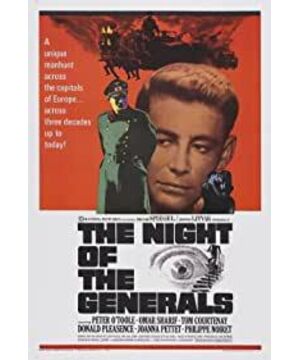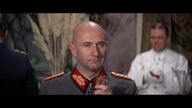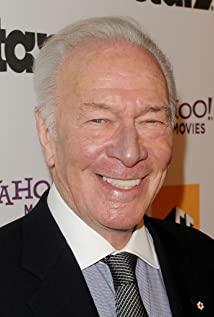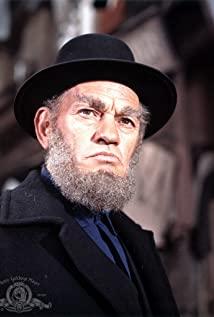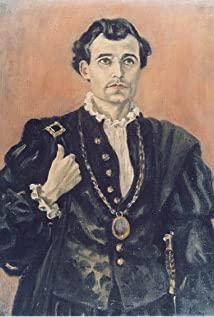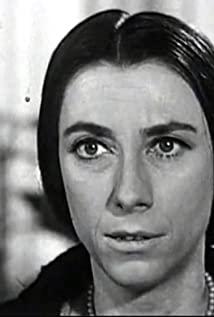When I first watched this movie, I felt that the level of directors and screenwriters of suspense films in the 1970s was very low. They chose such a bizarre and absurd theme to investigate a murder case committed by a German general in a Nazi-occupied area in World War II. madman! In fact, not only Uncle O'Toole is a lunatic, but Major Graw, played by Omar Sharif, is also crazy with him, and he is even more crazy than him, even crazy enough to rush to the arrival of the coup who assassinated Hitler. Arrest him for the murder of a prostitute! As a result, he was shot and killed by Peter, who knew a little more than him, and was charged with treason for eight lifetimes. Ironically, Gabler and Gabler, who really belonged to the coup d'etat of the German military in Paris, were on the verge of death. General Kallenberg escaped the execution for treason, and after 20 years, one was busy running around the world and the other was sitting in his manor leisurely writing a memoir.
At the end of the film, it was discovered that the director and the original book did not talk about war at all, no matter what. Whether in Warsaw or Paris or post-war Hamburg, the war is just a background, the focus is not on the war but on the crime itself. In Warsaw in 1942, when faced with the most tense Eastern Front adjacent to the war and the raging Polish guerrillas. Pile of questions, as the occupying army, who would be interested in dealing with the murder of a vile Polish prostitute, even if she was actually killed by a so-called general. It was clear that Major Crowe had been out of the war since the beginning of the war, and after receiving an oral account from a seemingly idiot-looking Polish witness, he went madly into Warsaw's three remaining generals - no doubt all of them. His superiors conduct a criminal investigation, but his subjects are not even interested in playing with him step by step: a random order terminates Major Crow's investigation and General Gabler is affected by his position in the Warsaw military and his daughter. Frustrated by the marriage, of course not in the mood to meet a quirky little major, and General Kallenberger is planning another murder at the moment—the murder of the Führer, just in case anyone knows it's too late I hope to assist in the investigation of this matter; and the real culprit in this case, the clean obsessive-compulsive disorder and SM murderer General Tanz, at this time, the people of the Warsaw occupation army regarded him and his Nibelung division as heroes to save the war situation. Come on, who would have thought that the general they admired would be a Jack the Ripper-like murderer.
Compared to the sloppy aristocrat Gabler and the obsessive-compulsive Tanz who are used to seeing the wind and the rudder, Kulenberg starts out as just a tedious poor bastard complaining about his own opinions being ignored ( Think about the same single + general, the sophisticated Mrs. General Gabler didn't even think about introducing her daughter to him), if a general like him flooded the army of Nazi Germany during World War II, it is estimated that it will not appear today. So many Defensive. But I was wrong, it turns out that his mediocrity is just a matter of prudence, just look at his active performance in the officer corps in Paris in the plan to assassinate Hitler, and his ability to retreat after the assassination failed. This old guy is not so simple. Most importantly, he is actually a hidden clue in this film. Except for Tanz, who will only torture and kill prostitutes at different times, Kallenberg's role in the film is much more interesting than him. The luckiest little white-faced Hartman in the film (because he not only survived the war as he wished in this film, but also got the general's coquettish daughter by the way, and actually survived from the mad Tanz gun and Yulia. The Frankfurt countryside, full of pig stench, was flying in two places, and it was hard to return. In the end, he was embarrassed. He complained to Tanz that you shouldn't let me go, General) and brought it into the staff, which resulted in a perfect adultery and an indirect impetus. Tanz's development in a crazier and bloodier direction, in addition to his order to transfer the righteous paranoid Major Crow to petty bourgeois Paris, allows him to have at least a period of peace and beauty before the paranoia explodes again two years later. Days (hope he doesn't encounter other murders at this stage) General Kallenberg, I'm here to thank you for Crowe.
I still don't understand the motives of Major Grau's insistence on investigating murders. Like Kallenberg said, he was still investigating his murders when the world was falling apart. Of course, the director set Grau's character to be Showing justice is everywhere even in times of war but what is the point of upholding justice for small individuals in a crazy context where thousands of people die for no justice? Aren't they somehow killed in a long-premeditated murder by a group of lunatics like General Tanz? Like in the movie Tanz's massacre of civilians in Warsaw's old town in the name of an exercise, who did it for them? In fact, Inspector Philip also asked Grau this question in the film, but the question itself is as unanswered as the ongoing war. Major Grau knew that he could not end this absurd and unjust war. For some reason that I can't explain either he can't do a new murder like General Kallenberg and his colleagues did to stop this war from murdering more people He's like a Buddhist story The merciful monk in the middle can only do his best to uphold the justice of the little people around him. I guess it is his quixotic persistence, not only in cooperation with the release of the three resistance members, which has won the respect of the inspector. No wonder Omar Shari. In the 1960s and 1970s, the old grandfather played his own role as an Arab, whether it was a Russian doctor or the Austro-Hungarian crown prince. Shaved if it wasn't for the signature hooked nose I didn't even recognize at the beginning, this is the desert knight Ali from Lawrence of Arabia
View more about The Night of the Generals reviews


